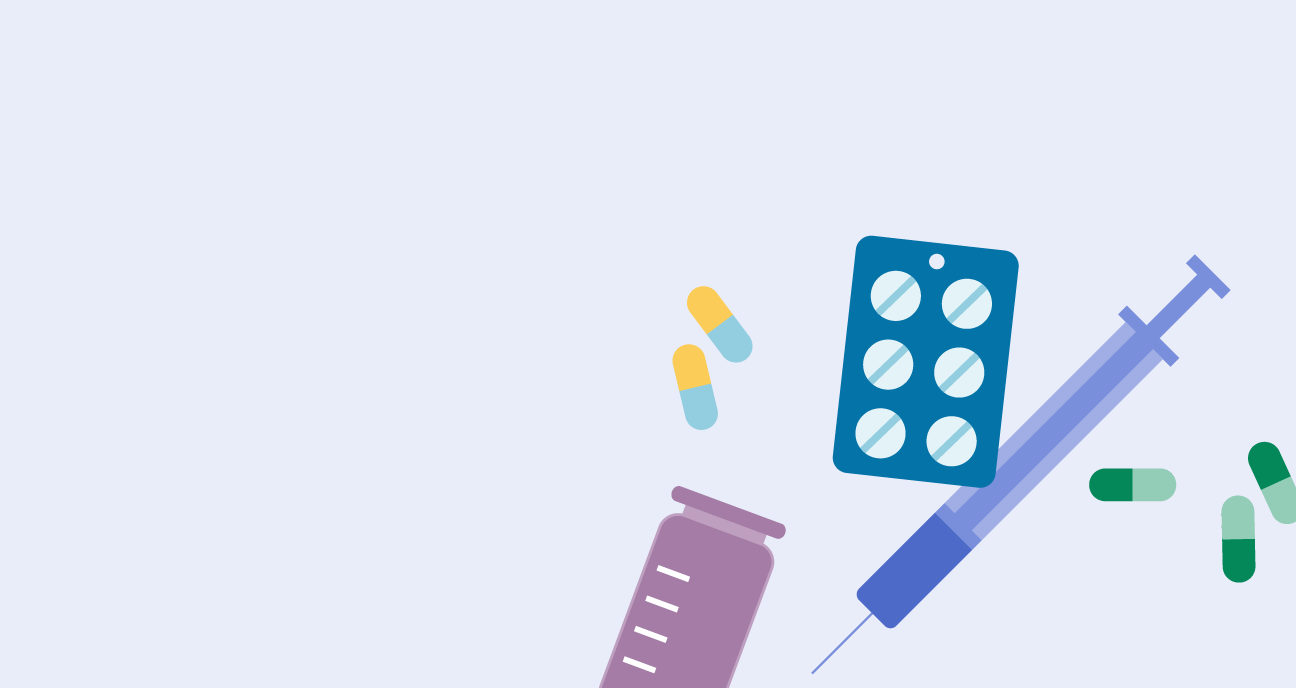Guide to IVF Medications

Medically reviewed by Linda Streety, RN, BSN
Throughout the in vitro fertilization (IVF) process, you will take medications to help your body develop multiple eggs and support an early pregnancy. These medications may be delivered in the form of patches, pills, creams, injections, vaginal gels, and/or suppositories. Below, we’ll talk about the types of medications you might take and how they work.
IVF medications that prepare your ovaries for stimulation
During ovarian stimulation, you will take hormone medications to help your ovaries produce multiple eggs during a menstrual cycle. Your clinician may prescribe medications to take before ovarian stimulation to help your body prepare for this stage of IVF treatment. Some of the medications you might take include:
Birth control
Birth control helps you and your fertility care team schedule your IVF cycle, meaning that you can control the start date of ovarian stimulation instead of waiting for your period. It also helps to ensure that the egg-containing follicles in your ovaries are developing at the same rate, which can increase the number of eggs retrieved. Birth control can also lower the risk of developing ovarian cysts. Your reproductive endocrinologist (RE) may prescribe birth control pills during the menstrual cycle before you start ovarian stimulation.
Lupron (leuprolide)
If your RE recommends the Lupron down regulation protocol for you, you will start Lupron injections a week before beginning ovarian stimulation, and continue taking Lupron during ovarian stimulation. Taken this way, Lupron suppresses the body’s release of luteinizing hormone (LH) and follicle stimulating hormone (FSH), which helps to ensure that your follicles develop at the same rate and prevents early ovulation.
Estrace (estradiol)
This pill delivers estradiol, the kind of estrogen created in the ovaries. When taken before ovarian stimulation, Estrace can be used to help synchronize follicle development so more follicles are available and they develop together.
IVF medications that encourage follicle growth
During your natural menstrual cycle each month, a cohort of tiny, egg-containing follicles grows at the same time in your ovaries. One dominant, or “lead,” follicle typically pulls ahead to be ovulated while the other follicles disintegrate and are absorbed back into the body.
One goal of ovarian stimulation is to encourage many more of this cohort of follicles to grow at the same time and rate during your menstrual cycle. Injectable hormone medications help you achieve this goal! These hormones are called gonadotropins, which are ovary-stimulating hormones usually secreted by the pituitary gland. Gonadotropins used during ovarian stimulation include luteinizing hormone (LH) and follicle-stimulating hormone (FSH).
Follicle-Stimulating Hormone (FSH)
FSH does exactly what you might expect from its name: it stimulates follicles to grow. FSH medications that you might take are Bravelle, Fertinex, Follistim, and Gonal-F.
Luteinizing Hormone (LH)
LH helps with follicle growth and egg quality. Menopur, Metrodin, and Pergonal are medications that include both LH and FSH.
IVF medications that maintain follicle growth and suppress ovulation
After about a week of follicle stimulation, your RE will add an injectable medication designed to suppress ovulation while your follicles grow. This is because if you ovulate the eggs too soon you will have to cancel the cycle. This medication allows your RE to control the timing of when the eggs mature and can be captured in an egg retrieval procedure before they can be ovulated.
Depending on your ovarian stimulation medication protocol, your RE will choose either a GnRH agonist or GnRH antagonist to suppress ovulation. Both these medications will suppress the surge of LH from the pituitary gland that would normally start the egg maturation process. The difference is that a GnRH agonist takes about 14-20 days to prevent the LH surge, whereas a GnRH antagonist will prevent that surge right away.
GnRH agonist
The most commonly used GnRH agonist used during IVF is Lupron (leuprolide).
GnRH antagonist
These medications include Cetrotide, Ganirelix, Antagon, and Orgalutran.
Side note: if you are on the agonist down regulation protocol, you will begin ovulation suppression before follicle stimulation.
IVF medications that trigger ovulation
When your lead follicles reach an optimal size, about 16-22 mm in diameter, your RE will schedule your trigger shot and egg retrieval procedure. This medication injection “triggers” your eggs to mature, meaning that they will shed half their chromosomes in preparation for ovulation. The timing of your trigger shot and egg retrieval are critical, since the retrieval procedure has to happen after egg maturation but before the eggs are ovulated.
Lupron (leuprolide)
On certain protocols, Lupron can be used as a trigger shot because it causes your pituitary gland to release the surge of LH that starts the egg maturation process.
Human chorionic gonadotropin (hCG)
Commonly known as the “pregnancy hormone” because it’s released by the placenta during early pregnancy, hCG also acts on the same receptors as LH and can be used as a trigger shot during ovarian stimulation. Some hCG medications include Pregnyl, Ovidrel, and Novarel.
Your RE may also choose a dual trigger, which includes both Lupron and hCG! It all depends on your ovarian stimulation protocol.
IVF medications before and after embryo transfer
Before and after embryo transfer, you may take medications to help your body prepare for and support an early pregnancy.
Progesterone
During your usual menstrual cycle, progesterone is produced by the perfectly normal cyst that develops after an egg is released, known as the corpus luteum. Progesterone helps to thicken the uterine lining in preparation for pregnancy, modulates immune system response so the body doesn’t reject the fetus, and prevents uterine contractions. During an assisted pregnancy attempt, you may start taking progesterone as early as a week before embryo transfer, and continue taking progesterone for 8-12 weeks after embryo transfer. Progesterone can be delivered as a pill to be taken by mouth, vaginal gel, vaginal suppository, subcutaneous injection, or intramuscular injection.
Estrace (estradiol)
Supplemental estrogen may be used to help thicken and maintain your uterine lining, and sustain an early pregnancy. You may start taking estrogen as early as two and a half weeks before embryo transfer, and continue taking estrogen for 8-12 weeks after embryo transfer. Estrogen can be delivered as a pill to be taken by mouth, a patch worn on the skin, an injection (as estradiol valerate), or a gel.
hCG
Your RE may give you a dose of hCG before embryo transfer to help increase your chance of successful implantation.
IVF medication side effects
Because these medications are similar to the hormones you usually produce during a menstrual period, the side effects are often the same, such as headache, nausea, abdominal pain, breast tenderness, and bloating. You may also experience injection site tenderness. (For a deeper dive into potential side effects, click here!)
One of the more serious side effects of IVF medications is the development of ovarian hyperstimulation syndrome (OHSS) after egg retrieval. You may be at risk of OHSS if your estrogen levels are high before you administer the trigger shot, and/or if you developed a large number of follicles (more than 20). Severe OHSS is very rare now, thanks to the development of new IVF ovarian stimulation protocols. However, even mild OHSS can be very uncomfortable. The symptoms of OHSS include bloating, constipation, reduced urinary output, and abdominal pain. If you suspect that you are experiencing OHSS, you should contact your clinic. However, if you notice that you are experiencing rapid weight gain (more than 2.2 pounds in one day), nausea and/or vomiting, severe abdominal pain, and/or shortness of breath, you should go to the emergency room for care.
It’s worth noting that the side effects of progesterone and estrogen supplementation after embryo transfer are very similar to the signs of an early pregnancy. However, if you take a pregnancy test too early, you may get a false negative result if it’s just too early in the pregnancy. You may also get a false positive result if you took an hCG trigger shot and did a fresh embryo transfer or if your RE gave you a dose of hCG just before embryo transfer. Because of this, it’s important to wait until your fertility clinic recommends that you take a pregnancy test, even if your symptoms seem encouraging.
How long do you take medication during IVF?
This depends so much on your body and the medication protocols your RE recommends. Some patients take ovarian stimulation medications for 10 days and don’t require progesterone or estrogen supplementation around embryo transfer. Other patients start taking medications a month before ovarian stimulation and require several months of progesterone and estrogen supplementation around embryo transfer. Talking to your RE about what medications you need for a successful cycle will also give you a sense of how long you will be taking medications.
How much do IVF medications cost?
There’s a very wide range in the cost of IVF medications because protocols vary so much. Some protocols, such as mini-IVF or natural IVF, use significantly less medication. Other protocols require more than a month of medication for ovarian stimulation, and months of medication around embryo transfer. With that in mind, you can plan to pay between $2000-7000 per IVF cycle in medication costs alone.
There are resources available to you if the cost of fertility drugs is prohibitive. You can see if your health insurance will cover some (or all!) of the cost. You can research grants to see if some (or all!) of the cost of fertility medications can be covered. You can apply for a discount on your medications. Finally, you can take out a loan to help with the cost of IVF.
Recent Articles
Share this
Recent Articles

Learn everything you need to know about IVF
Join the newsletter for IVF education, updates on new research, and early access to Alife products.



